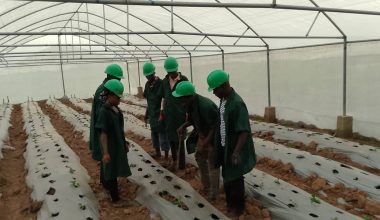Habanero pepper, also known as scotch bonnet pepper, is a popular spice in Nigeria and other parts of the world. It is known for its spicy flavor and is commonly used in cooking, seasoning, and making sauces.
Growing high-quality habanero pepper requires careful attention to several essential inputs. Here are some key factors to consider for successful habanero pepper farming in Nigeria:
- Soil preparation: Habanero pepper requires well-drained soil that is rich in organic matter. Before planting, the soil should be prepared by clearing weeds and debris, tilling the soil to a depth of at least 20 cm, and incorporating compost or other organic matter to improve soil fertility.
- Seed selection: Choose high-quality habanero pepper seeds from a reputable seed supplier. Look for seeds that are disease-resistant and well-suited to the local climate and soil conditions.
- Planting: Habanero pepper is typically planted in the rainy season when soil moisture is adequate. The seeds should be planted at a depth of 1-2 cm and spaced about 50 cm apart in rows that are 1 meter apart.
- Irrigation: Habanero pepper requires regular watering, especially during the dry season. Irrigation should be done in the early morning or late evening to reduce water loss due to evaporation.
- Fertilization: pepper requires adequate nutrients for optimal growth and productivity. Apply a balanced fertilizer that contains nitrogen, phosphorus, and potassium at regular intervals throughout the growing season.
- Pest and disease management: Hot pepper is susceptible to several pests and diseases, including aphids, thrips, and powdery mildew. Use appropriate pest and disease management practices such as crop rotation, use of resistant varieties, and application of organic or chemical pesticides as needed.
- Harvesting: pepper is typically ready for harvest 60-90 days after planting, depending on the variety and growing conditions. Harvest the peppers when they are fully mature but still firm and glossy. Use a sharp knife or scissors to cut the peppers from the plant.
In summary, successful habanero pepper farming in Nigeria requires careful attention to soil preparation, seed selection, planting, irrigation, fertilization, pest and disease management, and harvesting. By following these essential inputs, farmers can produce high-quality habanero peppers that are in demand in local and international markets.
 Greenhouses
Greenhouses






















Reviews
Clear filtersThere are no reviews yet.